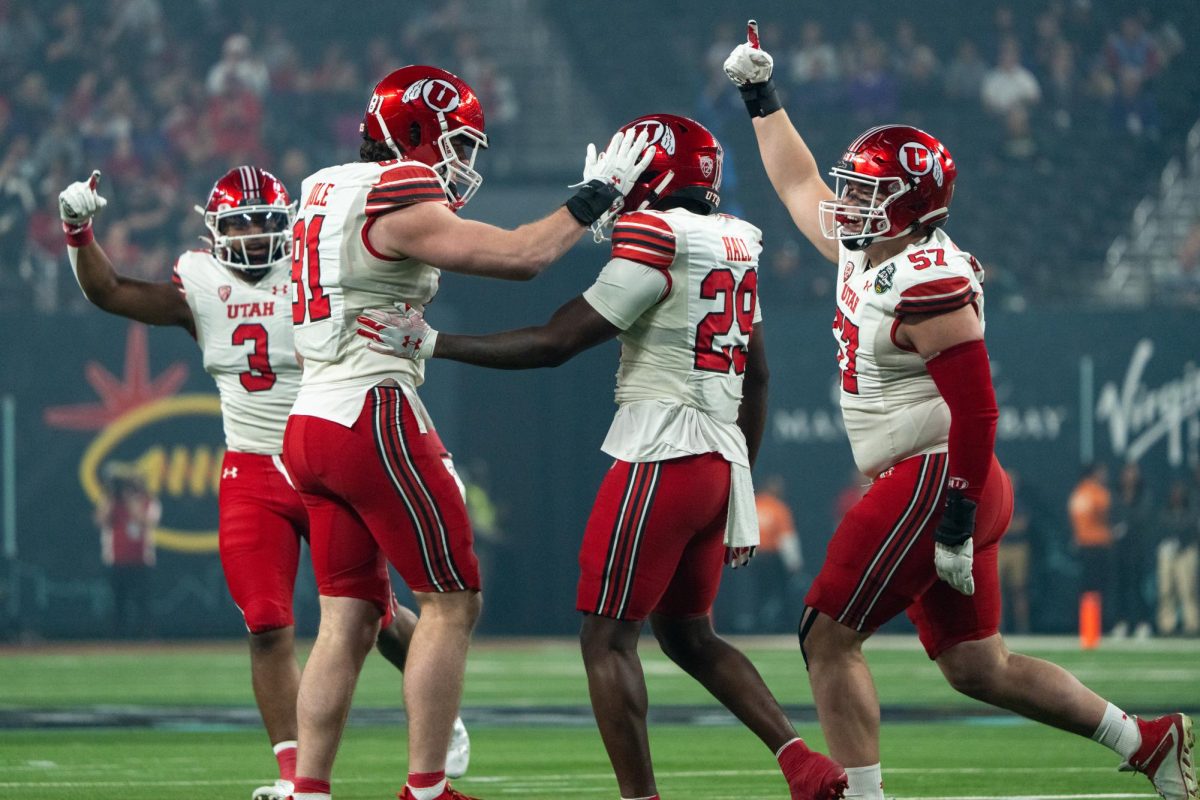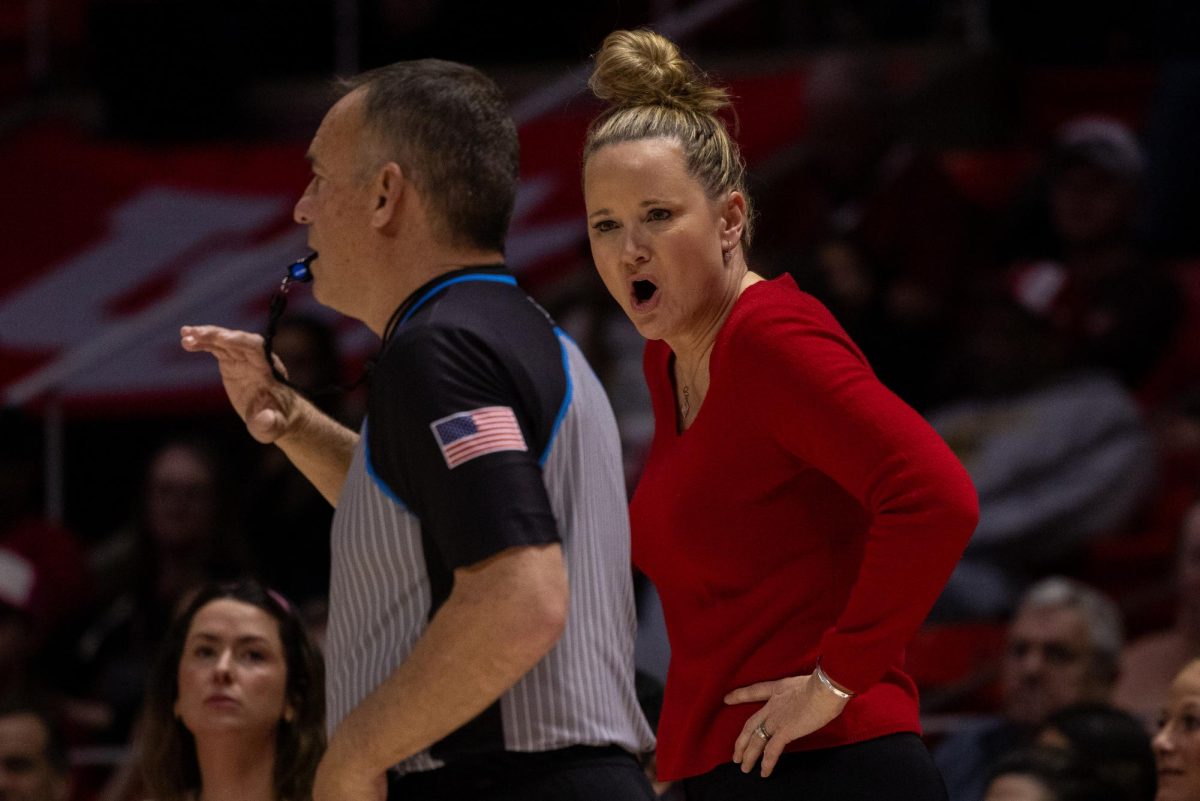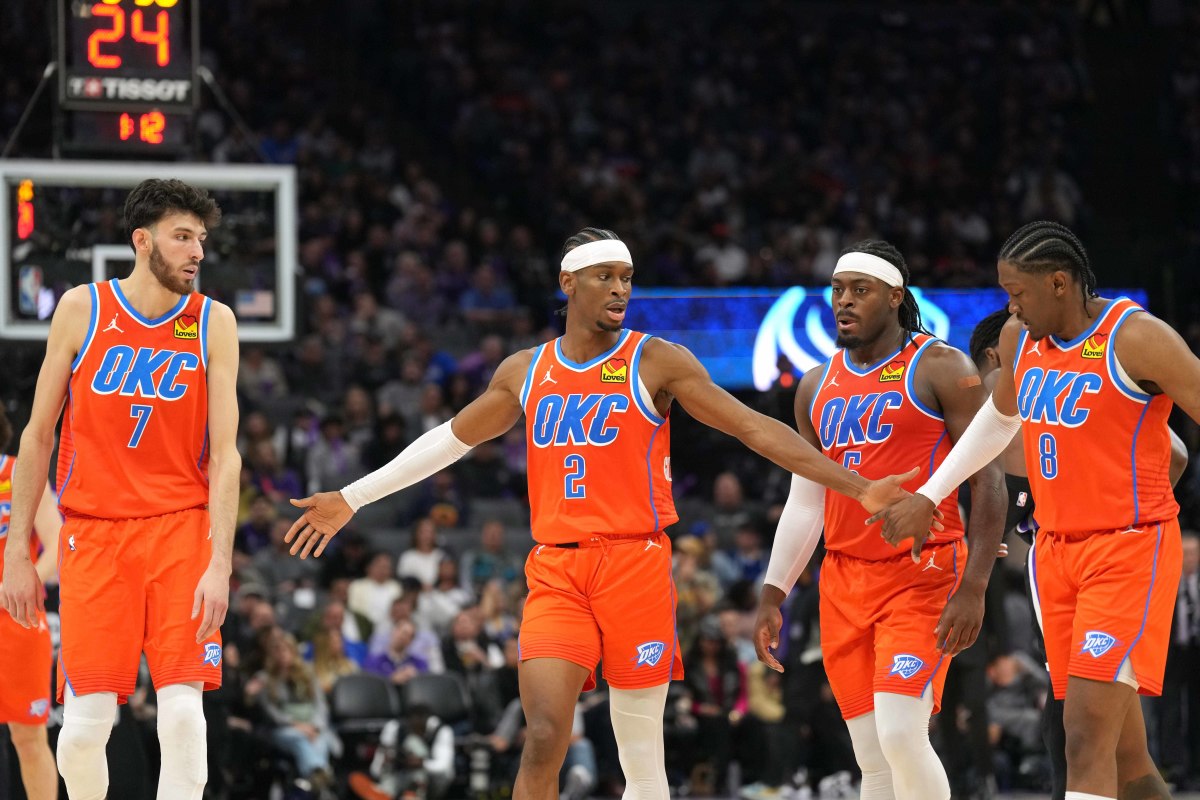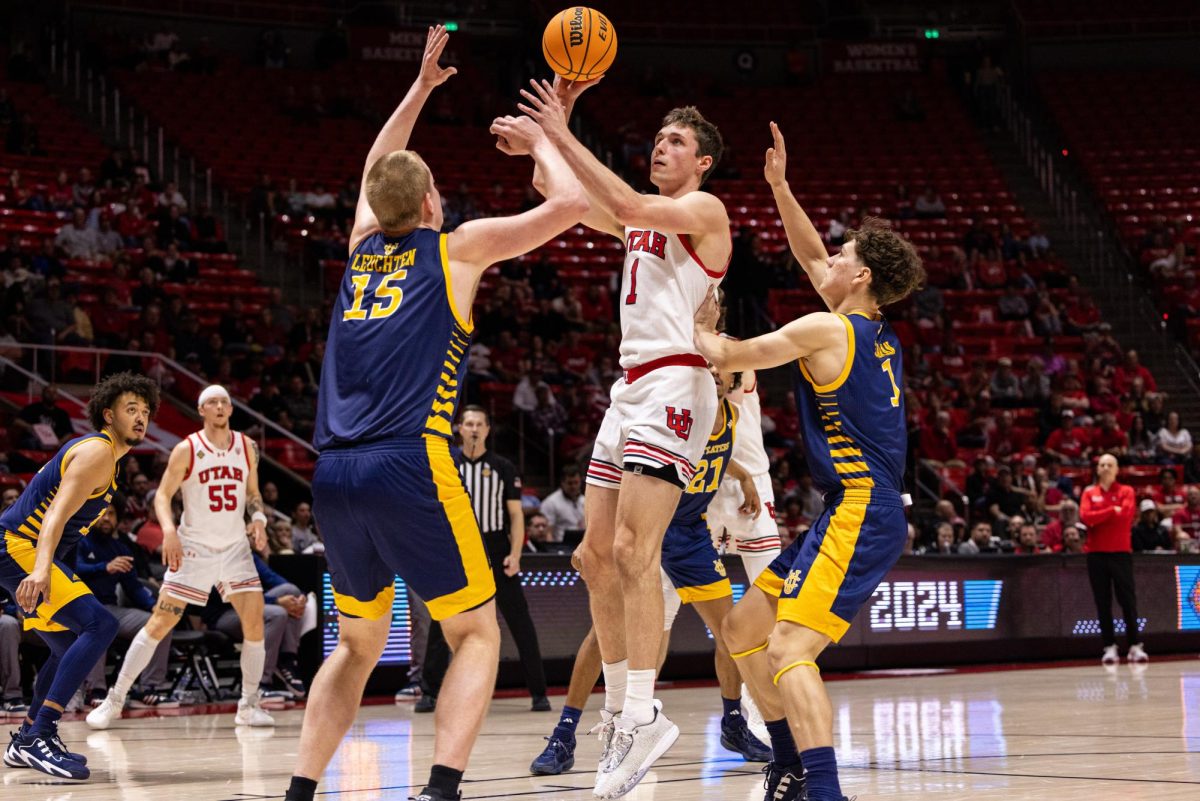Overfield: A Live Game Can’t Be Beat
Attending sports games has been a staple of American entertainment for many generations.
With the rise of television and social media, however, the novelty of attending a game has disappeared since games have become more available in our homes. Streaming services allow us to watch games in real time and social media keeps us updated with play-by-play photos and videos.
With every argument, there are two sides. While it is convenient to watch games from the comfort of your own home, there is a lot to be said for experiencing all of a game day in person.
During the 2018 regular season, a total of 17.1 million fans attended professional football games. This is not including people who went to professional baseball, soccer or hockey games.
At the University of Utah, fans have attended 50+ sold-out football games in a row and the Red Rocks gymnastics team holds the NCAA record for the highest-attended women’s sport with over 15,000 fans present at each meet.
Fans who attend games can all agree that being in the stadium brings a unique component to the overall experience of the event.
U student Derek Quick, who is a member of the MUSS, has been watching Utah sports since he became a student. In addition to attending games, Quick has been involved with the Intramural Sports program through Campus Recreation Services as both an employee and an athlete since he was a freshman in 2016.
Quick enjoys the game-day atmosphere of football games, but to him, there is nothing like watching a lacrosse game in person. Like many, he enjoys the perks of being a U student, which include free or reduced-cost access to Utah sporting events. He takes advantage of every opportunity to attend games.
“I feel like when you go in person, it’s almost a whole day affair and it gets you psyched for it,” said Quick. “Especially football games. You have tailgates before and those are always super fun. It’s just a good way to get excited for the game. When you are at the game, it is definitely a much more exciting atmosphere because everyone is super stoked to be there and it gets super loud. When you are at home, you can do whatever you want but it’s just not as exciting.”
The game day atmosphere is one that you cannot replicate.
The Experience
When you go in person, it’s almost a whole day affair and it gets you psyched for it. Especially football games. You have tailgates before and those are always super fun. It’s just a good way to get excited about the game. When you are at the game it is definitely a much more exciting atmosphere because everyone is stoked to be there and it gets super loud. When you are at home, you can do whatever you want but it’s just not as exciting.
The Crowd
When you are part of a good crowd, it is always a good time. Everyone is always super excited and I feel like you can get way more into the games when everyone around you is also into the games. Even if your group isn’t super into the game, there are thousands of people around you who are excited to be there. It’s just a more fun atmosphere, more involved.
The Expenses
It depends on the expenses. I’ll go to the Utah games, but I’ll go because it’s either free or incredibly cheap, whereas when I watch at home, I don’t have cable so I stream them more or less illegally. It’s free to sit on your couch but as a student, the games are also free, so the price doesn’t really factor into it.
So which is better?
It’s just a thrilling environment to be in and you’re excited because everyone else is excited and it’s hard to get that when you’re at home. At home, I’m just not as involved in what’s going on. If I’m watching a game from my couch, chances are I’m either playing on my phone or playing on my Nintendo Switch and not fully paying attention. When you’re at the game, you are 100 percent focused on the game or at least 95 percent focused on the game. It’s more engaging for sure.
Janis: Put Comfort First
There’s a grim fact that sports viewers around the world need to realize and embrace — the stadium is a dying effort.
The hundred-million-dollar power move by team owners to host professional teams is only lucrative and beneficial to team owners and executives, who make away like bandits with the funds of loyal fans who just want to see their team succeed and prosper. Inflated pricing on food, demanding payment just for transit to the stadium and charging ridiculous amounts for what can only be described as “meh” seats. The whole thing is a scam and that is why the empire of sports in the living room is taking over households.
Aside from the robbery that takes place at every stadium, the idea of the “game day” just doesn’t fit the mold of the American lifestyle anymore. On average, the working class is busier than ever before, and while the free time available to the majority of people is lessening, game times are at historic highs.
“One thing that all of us can agree on,” said SBNation’s Bill Connelly, “Games are just too… damn… long.” He’s not wrong either. The average NCAA football game is just over three hours. That’s as long as the average baseball game last year. What makes the time go by faster is the entertainment on the field, sure, but what’s to say that a fan can’t get that same experience from the comfort of their living room?
The Experience
I fully understand the nostalgia associated with going to the ballpark with grandparents to enjoy the sights and sounds of a baseball game. If you’ve never done that, however, or if that wasn’t available to you, what would the incentive be for going to a game? The only thing that comes to my mind is the idea of being at a historic sight, but for over half of the professional teams that haven’t done anything meaningful in a few decades, that’s simply not a factor. What incentive is there to sit in either brutal heat for summer baseball, or bitter cold for winter football, when a fan can watch the exact same game, with calculated camera angles and air conditioning?
The Crowd
Some of my deepest and most passionate sports memories involve being around family. The venue was usually secondary and it was nice if we could catch a game involving our favorite teams while traveling, but largely, most of my memories of sports occurred in front of a television, in a living room, with nothing but close family and friends around to celebrate. When you stay at home to watch the game, you get a tailored game day experience. Rarely is halftime entertainment geared towards the in-stadium crowd. The only exception to this phenomenon is the college atmosphere, but most of the time, the entertainment is focused on the student sections and younger crowds, as opposed to families and older viewers.
Another part of this is the idea that a lot of viewers feel more comfortable watching sports while around their families than in a conglomeration of strangers. There’s much more guaranteed safety that comes with watching from home, as stadium violence makes its rounds as seasons progress and playoff races get tighter and more passionate. If you have specific needs or wants at a game’s viewing party, you get to be in control of that, instead of having to cover your baby’s ears while Jim from row 228 shouts obscenities down at the coaches.
The Expenses
Sports are one of the most expensive activities to attend, short of concerts and traveling. Every single aspect of a sporting event has a price tag on it nowadays, and that’s not even considering season ticket holders, who get fleeced on a regular basis. The average ticket cost to watch the Golden State Warriors at home last year was $240, and that’s just to get you in the door. That doesn’t account for getting to the stadium, possible travel for out-of-state viewers, parking at the stadium, food and other game experiences. Warriors fans can’t even complain because they have the luxury of watching a legendarily stacked team, while teams like the New York Knicks, who charged an average of $190 per ticket last year, went 29-53. And championships? Forget about it. Somebody paid $14,500 to watch the Warriors spank the Cleveland Cavaliers in last year’s NBA Finals. And that was for a single game.
The other professional leagues are no different. The Cleveland Browns, who went 0-16 two years ago, still had the audacity to charge $66 for the average ticket and those fans couldn’t even be inside to watch their team stink. They had to endure the bitter, sub-zero temperatures of Cleveland, Ohio in December. If teams want to get fans back into stadiums, there needs to be a clear correlation between the strength of a team and price of an entrance fee. It’s so bad that the NFL actually celebrated the reasonably priced stadium food offered at Super Bowl LIII, bragging on social media that fans could enjoy a beer and hot dog for less than $15.
The obvious economic move is to invest in televisions and sports streaming packages. Amazon streams Thursday Night Football to its Prime subscribers, Hulu is taking on live sports in their battle to overthrow Netflix, and for the technologically inclined, watching a game is as easy as finding the right sketchy Youtube link. When companies compete for your screen time, all that means is that the viewer gets better deals and more content for what they pay. It’s not even close how much a viewer saves watching the same game on television versus going to the game itself.
So which is better?
Something that the in-home experience gives fans is control and safety. As mentioned before, putting the game in the home gives control to whoever owns the televisions, not stadium executives. Don’t like commercials and breaks? Well, chances are there are a plethora of other games to watch. Have a hot take about the teams that are playing? It’s much easier to talk about it in a comforting environment like a living room. Need food? You can buy the food they sell at stadiums for fractions of the cost, and it’s usually fresh and of better quality. Need some alcohol? Stadiums markup alcoholic beverages as much as 30 percent, and that number increases with the amount poured per drink.
Speaking of alcohol, watching games from home is much safer than traveling to the stadium. Drunk driving, assault charges and even sexual harassment have all made appearances in stadium crowds. When a bitter, angry fan of a losing team meets enough liquor to tranquilize an elephant, it’s only a matter of time before someone gets a can thrown at them for wearing a different jersey.
























